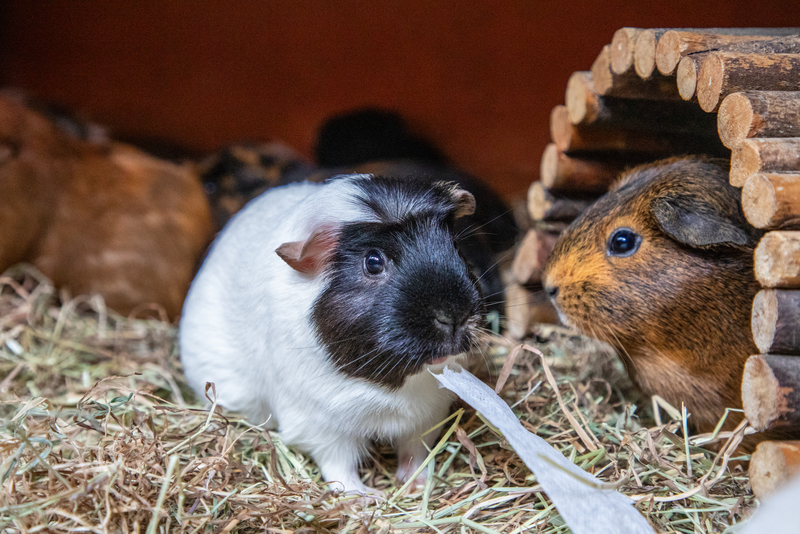THE RSPCA is tackling a large rise in the numbers of guinea pigs who are being given up by their owners or cruelly abandoned.
Overbreeding of guinea pigs and the ongoing impact of the cost of living crisis, as well as a lack of knowledge about the species by inexperienced owners, is hitting the small creatures hard – leaving RSPCA resources at breaking point.
The latest figures from the animal charity shows there has been a 37% increase in the numbers of guinea pigs taken in by its animal centres during the first eight months of this year compared to the same period in 2022.
In all 237 guinea pigs arrived into the care of the charity up to August, which is already almost as many as were taken in during the whole of 2022. This worrying trend seems well established – with last year’s intake of 253 marking a 77% rise on the previous year, mirroring a rise in the numbers of rabbits and other small furry animals that the charity has been left to care for and rehome – including massive rises in the numbers of rats (193%) and mice (191%) over the same period.
As it aims to deal with the crisis, the RSPCA is backing Guinea Pig Awareness Week (GPAW), which runs from September 25 to 29 with the aim of educating the public about the welfare needs of the small animals.
This year’s theme for GPAW is ‘Rescue and Rehome’ with the focus also on finding forever homes for the thousands of guinea pigs who are being cared for at animal centres across the country, with both RSPCA and those run by other animal welfare organisations.
Dr Jane Tyson, the RSPCA’s small animals welfare expert, said: “Pet ownership rose significantly during the pandemic and people often think that guinea pigs will make good starter pets for their children.
“But, like other small animals, they actually have complex needs and they are not easy or cheap to care for well. Owners don’t always correctly sex small animals either, so a pair can quickly spiral into double figures and beyond.”
Guinea pigs are sociable animals and owners are advised to keep two or more together. But that can lead to unwanted litters if there are unneutered males and females. Breeding can soon get out of control – and mothers can get pregnant again within hours of giving birth with pregnancies lasting only nine to 10 weeks.
Swelling the numbers in the care of the RSPCA recently were 45 guinea pigs who were signed over to the RSPCA Sussex North & Brighton Branch along with 38 rabbits. The pets were being kept in overcrowded conditions in the backyard of a property in Bognor Regis by an owner who became overwhelmed after starting with only a handful of pets.
The RSPCA worked with the owner to remove around 15 more guinea pigs who were placed with an approved foster carer.
The charity’s officers always offer advice and education to owners to tackle cases of overbreeding – and expert guidance in a downloadable digital pack is being made available as part of Guinea Pig Awareness Week.
It includes advice on making sure guinea pigs are kept in a suitable environment with enough space inside their homes and enclosures to exercise and explore.
Guinea pigs should also have a range of toys, tunnels and hiding places on hand so they can exhibit their natural inquisitive behaviour.
GPAW is also being supported by Woodgreen Pets Charity, Blue Cross and Raystede Centre for Animal Welfare.
A spokesperson for GPAW said: “Given the growing number of guinea pigs in rescues and in need of loving homes, it is really important that we educate as many owners as possible so that these wonderful creatures can live the happy life they deserve.
“We know that rescue centres play a vital role in ensuring that owners have access to the right information about guinea pigs, which is why we would love to see more rescues than ever downloading and sharing our free digital packs in support of this year’s GPAW.”
There is a wealth of information and advice on the RSPCA website to guide existing owners and anyone who may be considering adding guinea pigs to their family.
Before making the commitment of ownership it is worth knowing that:
Typically guinea pigs can live for five to six years and some may live longer
Guinea pigs are active up to 20 hours per day, only sleeping for short periods
They are highly social creatures – in the wild they live in family groups of five to 10
They get lonely and shouldn’t be kept alone – they’re happiest in pairs or small groups
Guinea pigs need a high fibre diet supplemented with vitamin C
Please donate here: Support Carmarthenshire News Online Thank you for supporting independent journalism and contributing to the future of local news in Carmarthenshire. Carmarthenshire News Online has been dedicated to providing unbiased and trustworthy news, free from commercial or political influence. By donating as little as £1, you can help ensure the continuation of this important source of information for the community. Your contribution will have a significant impact on the sustainability of independent journalism. If you're looking to enhance your brand's visibility, we also offer advertising opportunities on our Livestream and podcasts. Our special offers provide excellent value for reaching our engaged audience. To learn more about these opportunities and to discuss your advertising needs, please feel free to call or text us at 07308598604. Thank you again for your support, and together we can ensure the availability of quality local news for Carmarthenshire and beyond.
Please donate here: Support Carmarthenshire News Online







